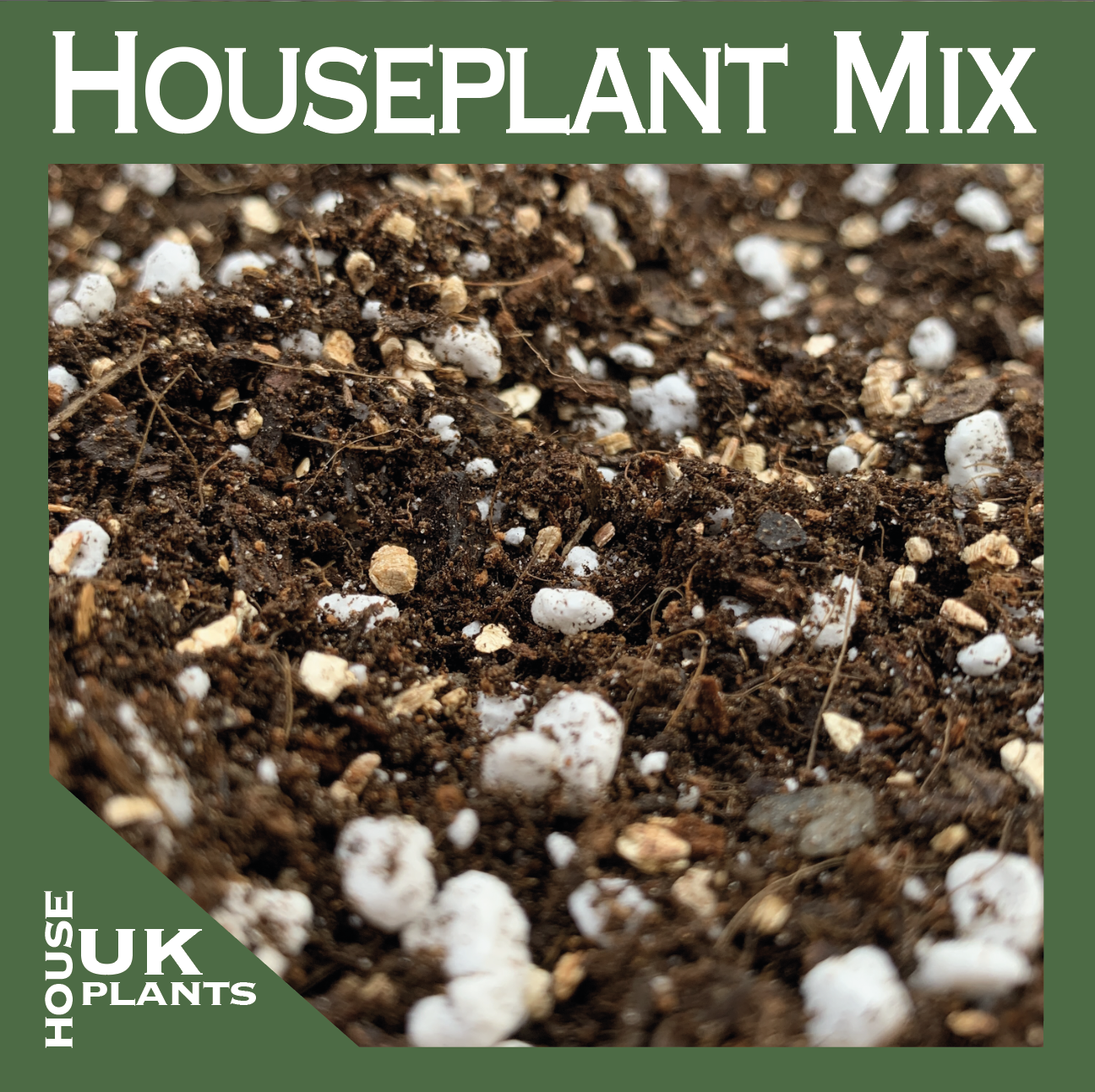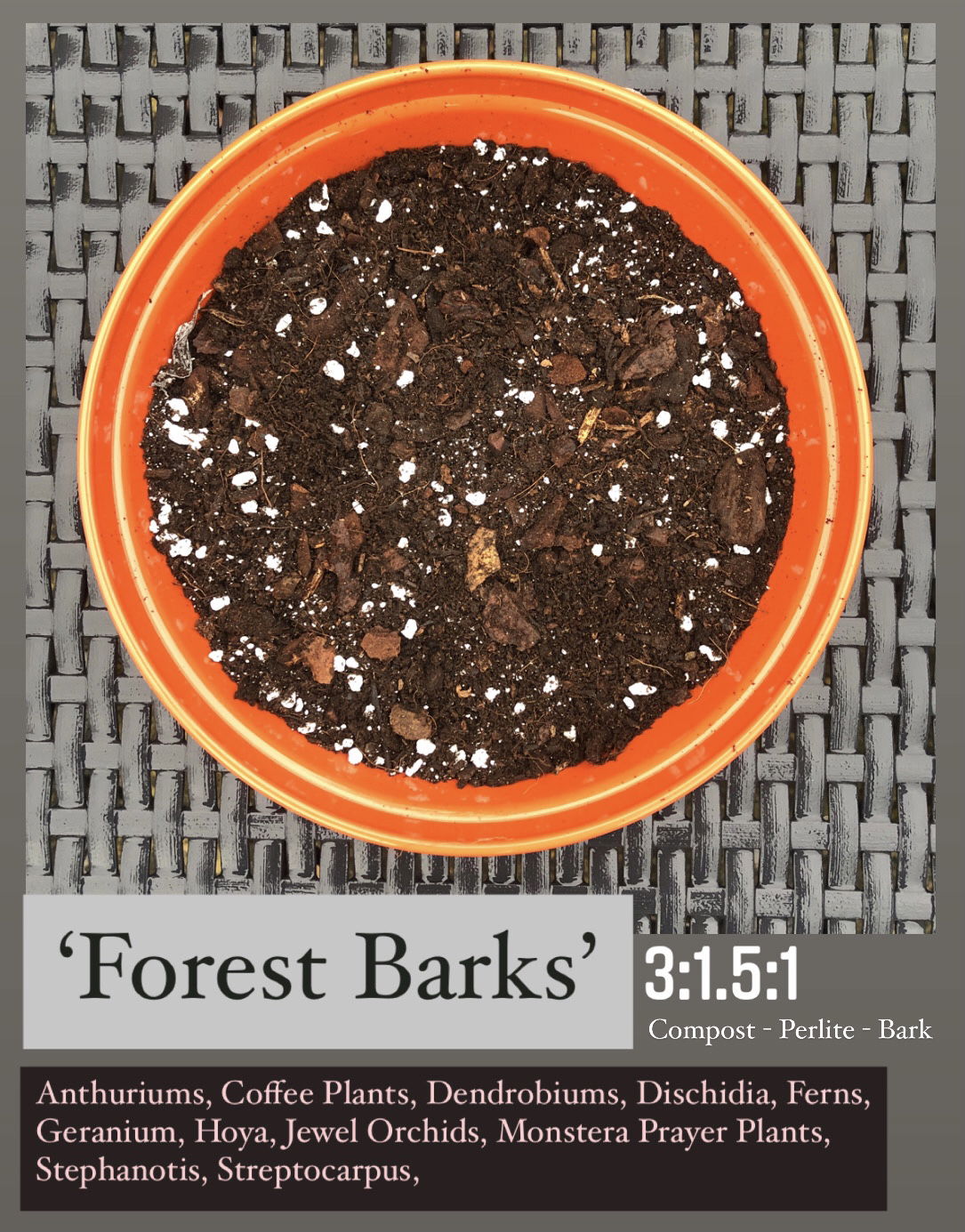Contents
- Introduction
- 'Houseplant Compost'
- Desert Cacti & Succulents
- Carnivorous
- Orchids
- Bonsai
- Citrus
- Ericaceous
- Terrariums
- Indoor Herbs
- Making Your Own Potting Mix (A Must-Read)
We've just opened our online shop!
Want to buy top quality products with FREE Delivery? Click here to view our new store, including everything from indoor potting mixes to moss pole hooks. Please support our small business!
1. Introduction
It's a well-known fact that a healthy plant grows in the appropriate potting mix. A soil-profile that's too water-retentive will strip the roots of oxygen, causing them to respire and slowly breakdown anaerobically. Buying (or making your own) compost that's tailored for the specific plant will benefit its overall health on many levels. The composts listed below can be found at any good garden centre, with prices starting around £3 for 4L. Even if you're not from the UK, still use this list to help you choose which is best suited for your plant. Most of these products have an alternative in different countries, for example, Brunnings for Australia & Miracle-Gro for the US.
If you're looking at placing different plants into one container to create an indoor garden or display, try to use specimens that belong in the same 'Compost Category' on our list. Have a look at the image below for inspiration of a successful 'Indoor Garden' that's now over two years old!
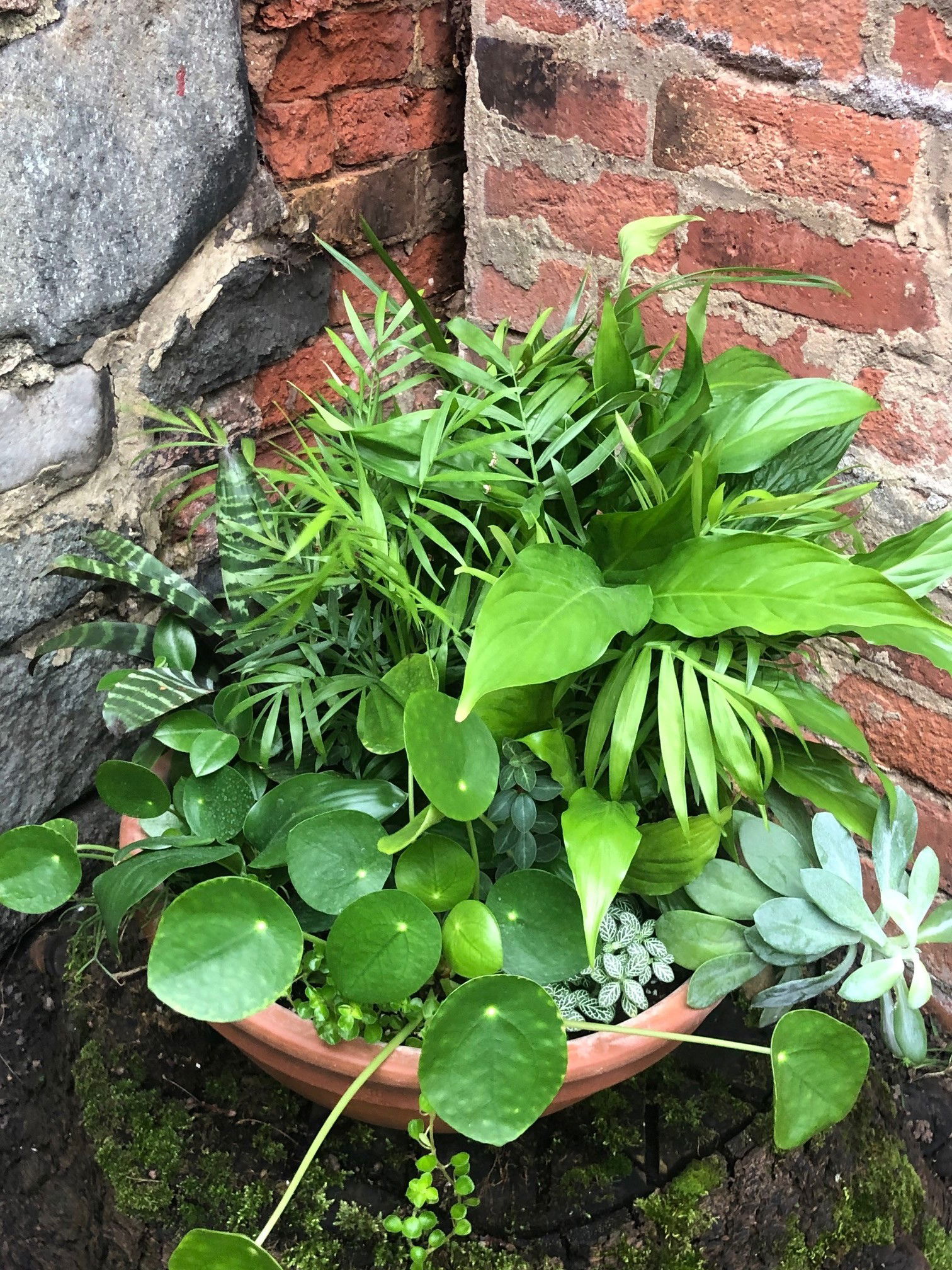 Making an arrangement with different specimens within the same 'Compost Category' (written below) is both fun and highly beneficial for the plants!
Making an arrangement with different specimens within the same 'Compost Category' (written below) is both fun and highly beneficial for the plants!
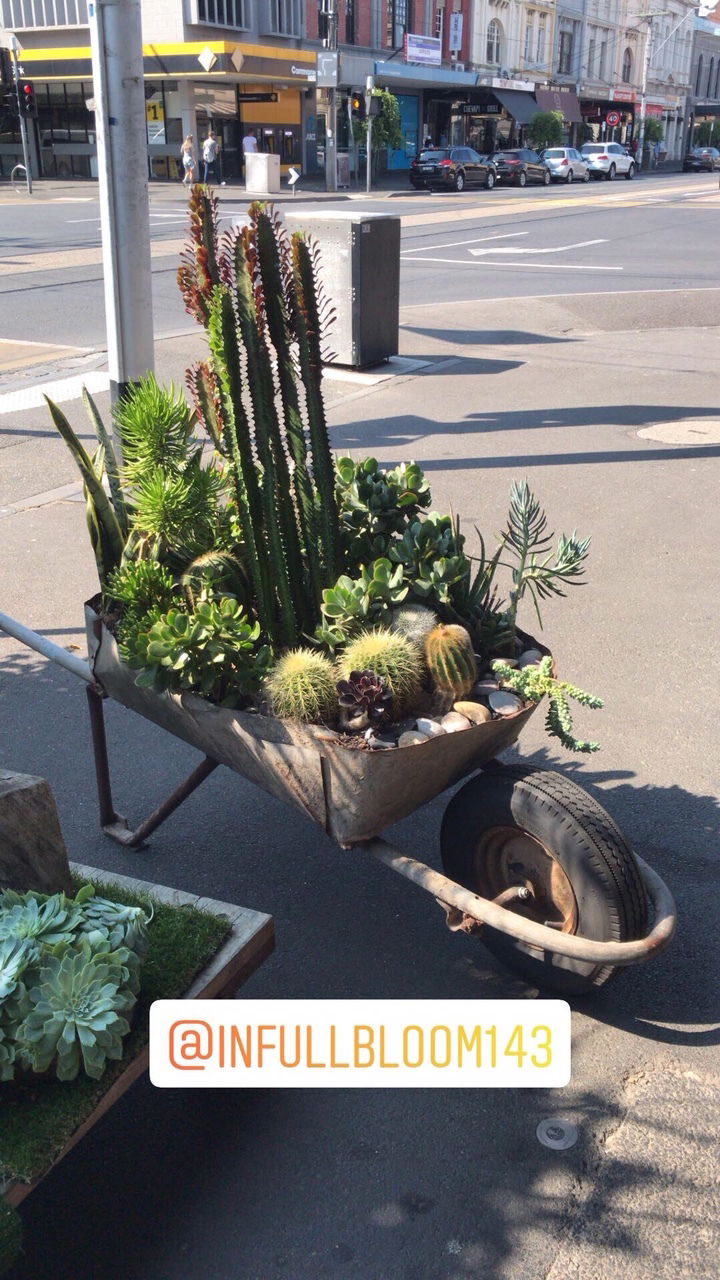 Another great example of using different plants within the same 'Compost 'Category'.
Another great example of using different plants within the same 'Compost 'Category'.
2. 'Houseplant Compost'
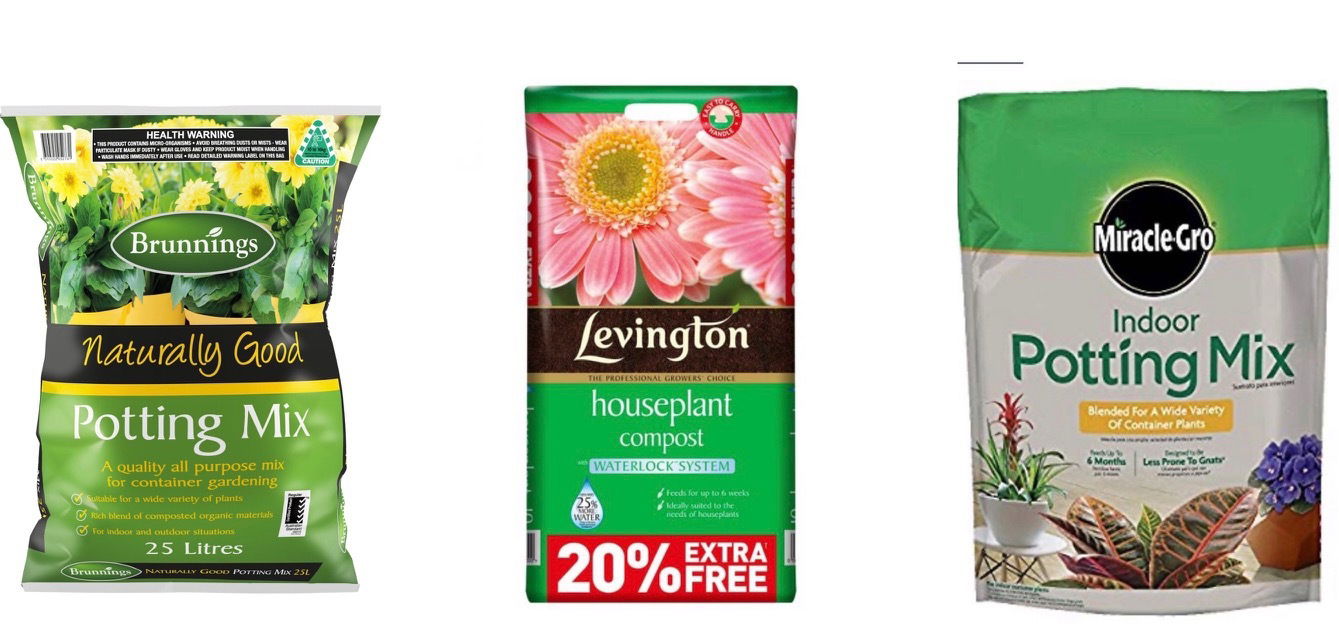 Brunnings (AUS), Levington (UK) & Miracle-Gro (US)
Brunnings (AUS), Levington (UK) & Miracle-Gro (US)
• Despite the name, this compost isn't acceptable for all houseplants, and instead is only for moisture-loving plants. Cacti and Succulents shouldn't be placed in this stuff unless extra doses of sand and perlite are added.
• Introduce some extra grit, sand or perlite if the plant is grown in a shady location. In essence, this will improve the drainage and aeration of the soil while reducing the chance of root rot from over-watering (familiar with dark areas).
• Bulbs (like Daffodils, Hyacinths, etc.) & Herbs (Capsicum, Tomatoes & Strawberries, etc.) can be placed in Houseplant Compost. For bulbs, introduce some extra grit and perlite to improve drainage and aeration.
• Fertilisation isn't needed for the first six weeks due to the stored nutrients in the soil.
- Aeschynanthus - Lipstick Plant
- African Violets - Saintpaulia
- Aglaonema - Chinese Evergreen
- Anthurium - Flamingo Plant (Add some Orchid Bark or Coconut Coir. (1 : 4 Bark - Houseplant Compost))
- Alocasia & Colocasia
- Baby Tears - Soleirolia or Helexine
- Banana Palms
- Begonia
- Bird of Paradise - Strelitzia
- Bougainvillea
- Caladium
- Calathea, Ctenanthe & Stromanthe - Living or Prayer Plants
- Calla Lily or Zantedeschia
- Callisia - Turtle Vines
- Cambria (Add some Orchid Bark or Coconut Coir. (1 : 4 Bark - Houseplant Compost))
- Campanula
- Cast Iron Plant - Aspidistra
- Chrysanthemums
- Citrus Trees (Citrus Compost is Recommended but H.P. Compost is Fine)
- Clivia
- Cordyline
- Coleus or Plectranthus
- Colocasia
- Croton - Codiaeum
- Dichondra
- Dieffenbachia - Dumb Canes
- Dizygotheca - Plerandra
- Dracaena
- English Ivy - Hedera
- Fatsia Japonica
- Ferns
- Ficus
- Fittonia - Nerve Plants
- Gardenia
- Geranium & Pelargonium
- Gerbera
- Gloxinia
- Heliconia - False Bird of Paradise
- Hoya
- Hydrangea
- Jasmine
- Jewel Orchid - Ludisia discolor
- Maidenhair Ferns - Adiantum
- Maidenhair Vines - Meuhlenbeckia
- Maranta
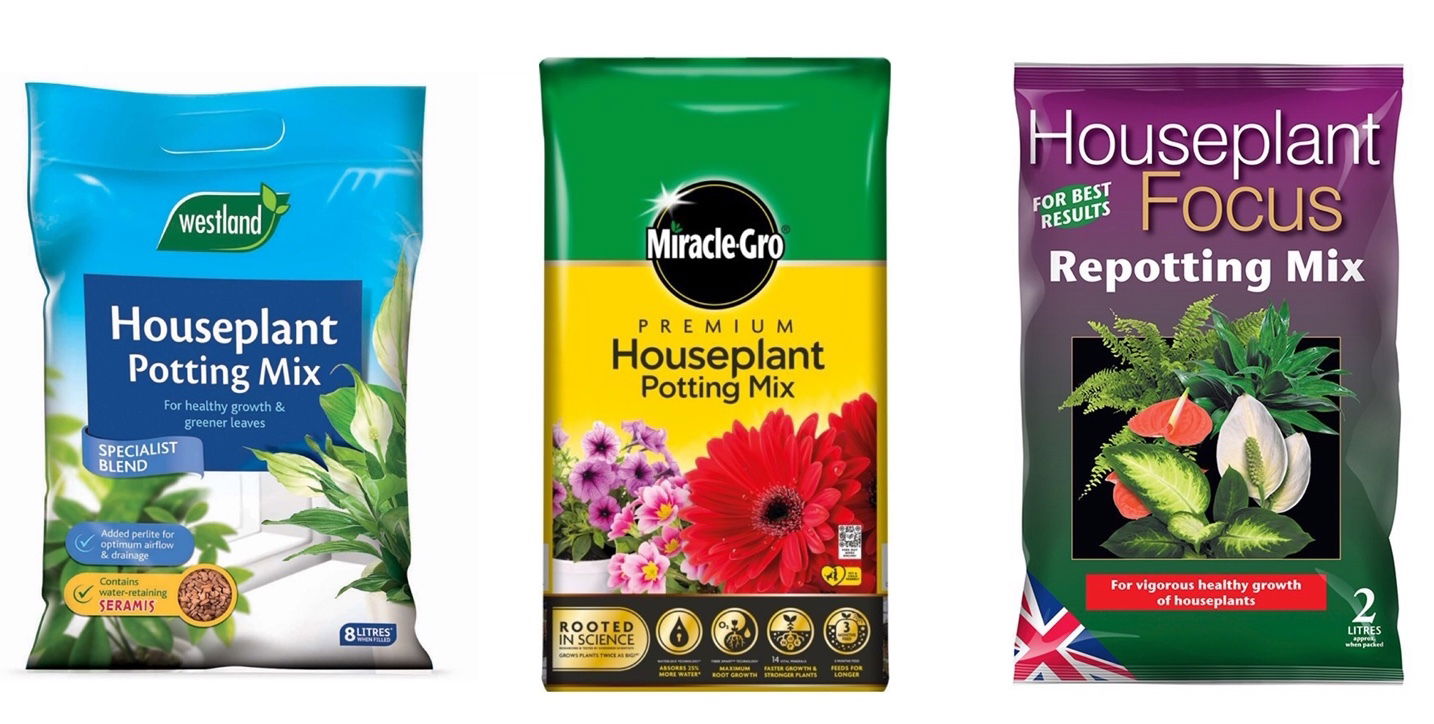 Other Houseplant Potting Mixes (UK)
Other Houseplant Potting Mixes (UK)
- Miltonia (Add some Orchid Bark or Coconut Coir. (1 : 4 Bark - Houseplant Compost))
- Monstera
- Norfolk Island Pines
- Oxalis
- Pachira
- Palms - Areca, Bamboo, Fishtail, Kentia & Parlour
- Persian Sheild - Strobilanthes dyeriana
- Peace Lily - Spathiphyllum
- Philodendron
- Phlebodium
- Pilea
- Poinsettia
- Polka Dot Plants - Hypoestes phyllostachya
- Polyscias & Aralia
- Pothos or Epipremnum, Devil's Ivy, Scindapsus
- Roses
- Siam Tulip - Curcuma alismatifolia
- Spider Plants
- Staghorn Ferns (Add some Orchid Bark or Coconut Coir. (1 : 3 Bark - Houseplant Compost))
- Stephanotis
- Streptocarpus
- Syngonium
- Tradescantia
- Tropical Cacti (Xmas/Thanksgiving/Easter/Zygo, Epiphyllum, Disocactus Hatiora, Hylocereus, Rhipsalis, etc.) (Add Sand & Perlite to Improve Drainage & Aeration)
- Umbrella Tree - Schefflera
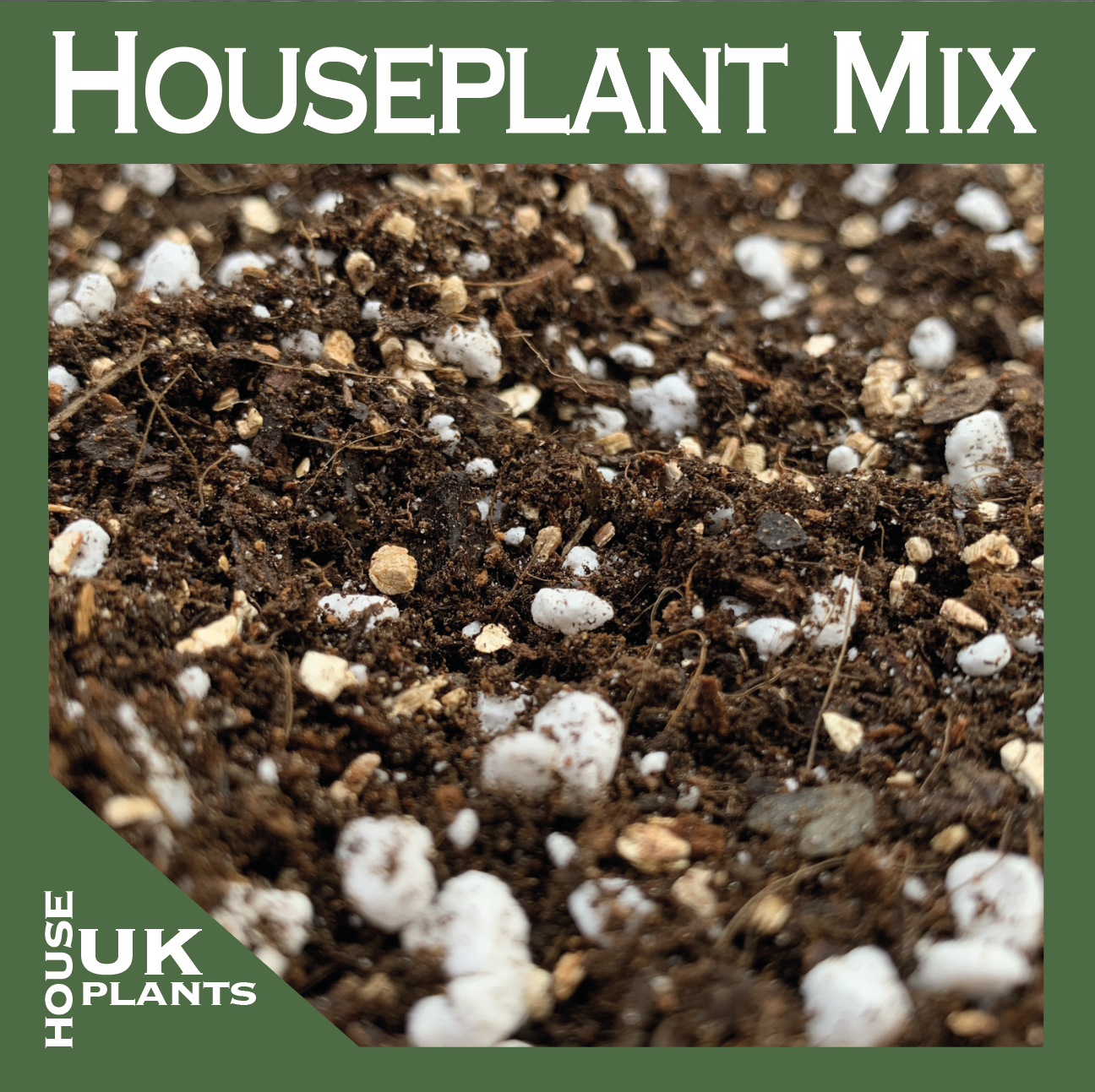
Keen on supporting our small business? Click here to view our peat-free Houseplant Compost that comes with free delivery & top-quality soil for healthy roots. Just £4.95.
3. Desert Cactus & Succulent Compost
Peat-free Cactus & Succulent Compost prices from ukhouseplants...
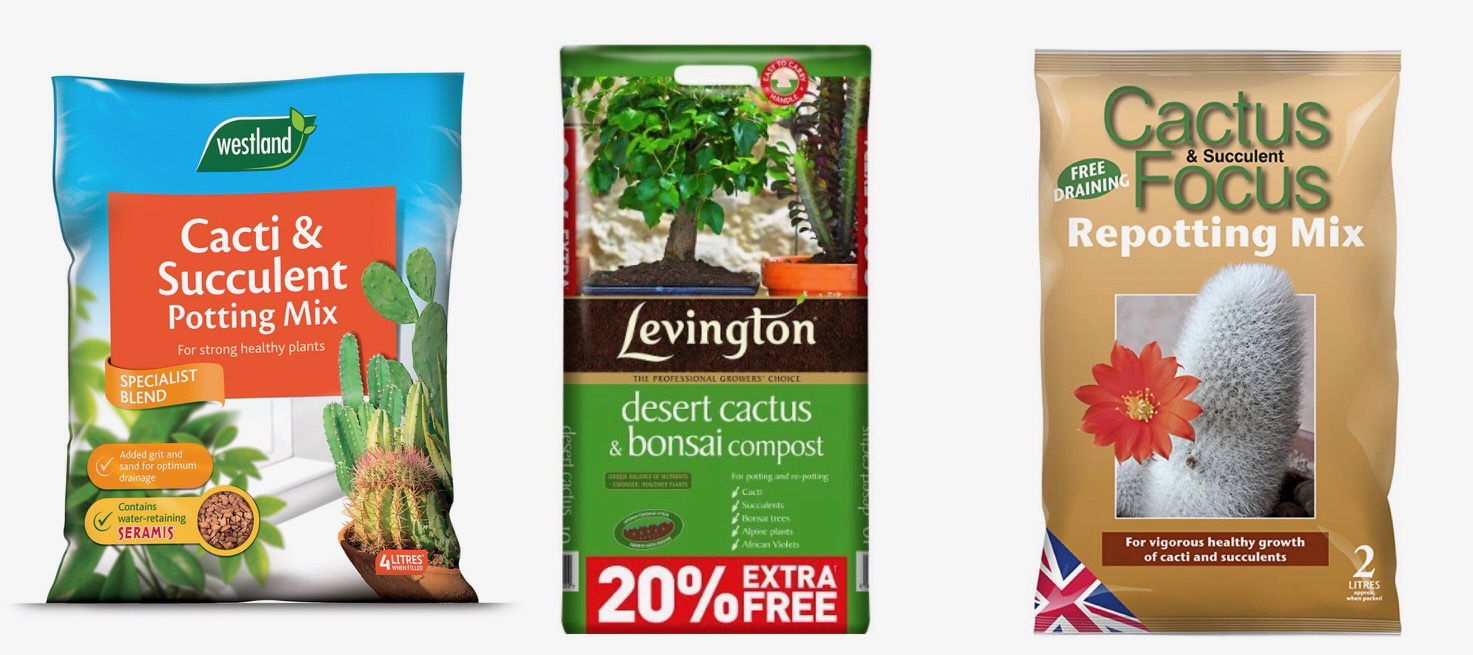 The Top 3 UK Cactus Composts
The Top 3 UK Cactus Composts
• Suitable for all desert / tropical cacti & succulents
• Slightly more difficult to find in garden centres, but still relatively cheap
• Can be substituted with Houseplant Compost when extra sand, grit and perlite is used (see the No. 10 on this list)
- Agaves - Tequila Plants
- Aloe Vera
- Amaryllis (Hippeastrum)
- Burro's Tails
- Desert & Tropical Cacti
- Ledebouria - Silver Squill
- Pachypodium - Madagascan Palms
- Papyrus
- Ponytail Palms - Beaucarnia or Nolina
- Sago Palms & Zamia
- Sansevieria - Mother-In-Law's Tongue / Snake Plant, Rocket Plants & African Spears
- String of Pearls, Bananas or Dolphins
- Succulents - Aloe, Crassula, Curio, Echeveria, Euphorbia, Gasteria, Haworthia, Portulacaria afra, Sedum, Sempervivum, Senecio, etc.
- Yucca
- ZZ Plants
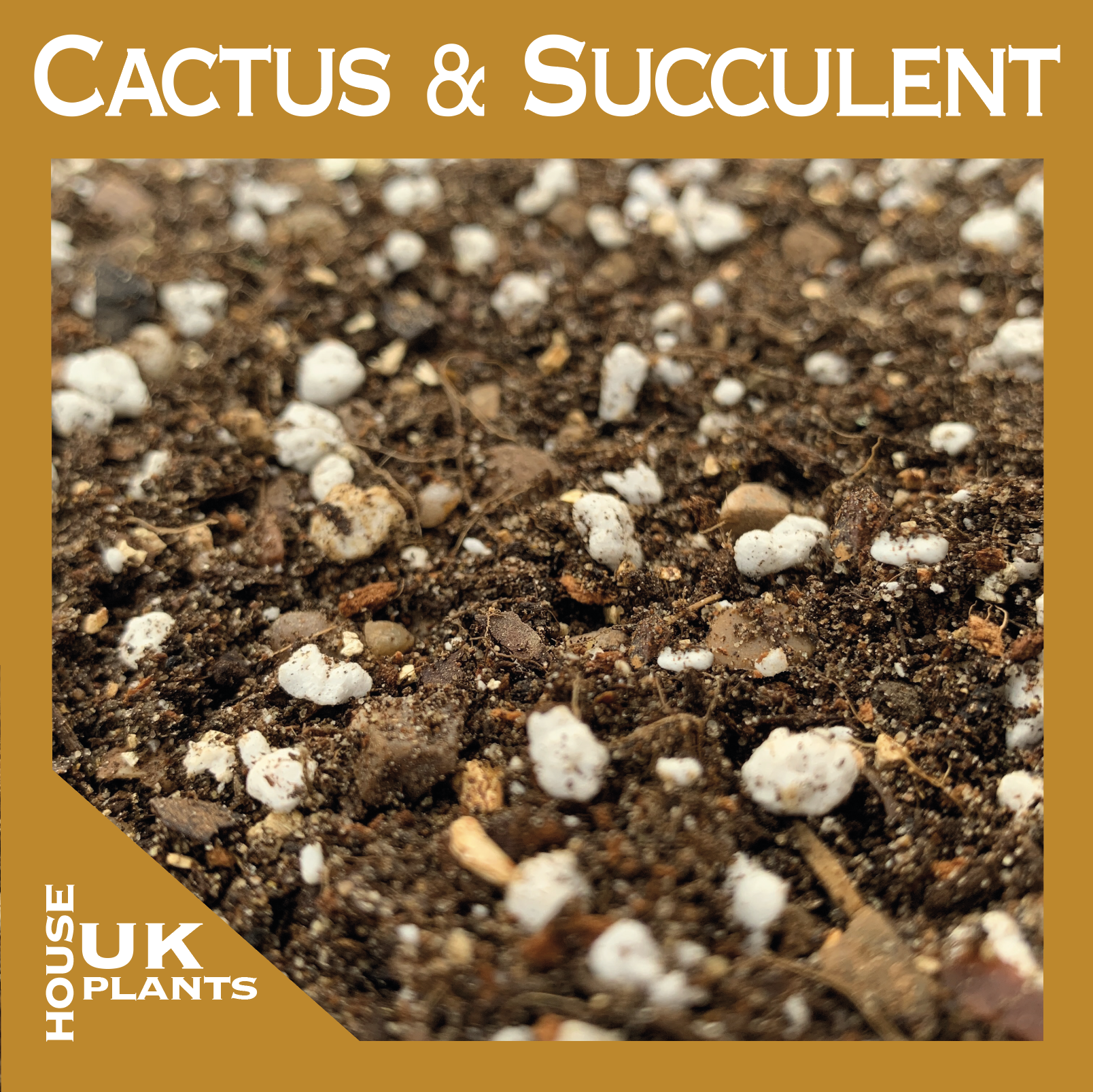
Our Cactus & Succulent Compost is good quality and peat-free that comes with free delivery across all of the UK.
4. Carnivorous Compost
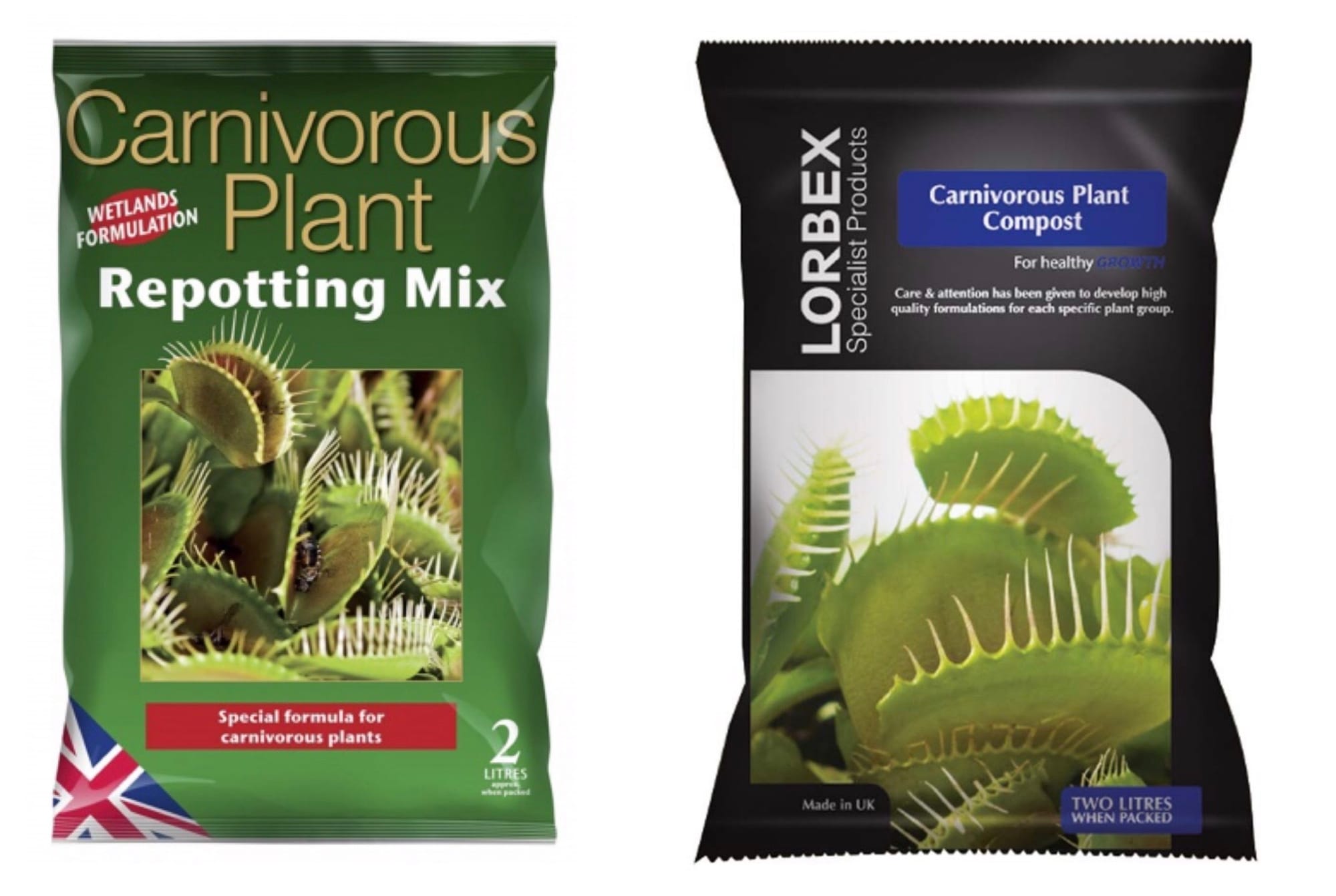 ukhouseplants' Recommended Carnivorous Potting Mixes
ukhouseplants' Recommended Carnivorous Potting Mixes
• Contains almost no nutrients which is mandatory for most insect-eating plants
• Carnivorous plants cannot be placed in any other soil
• Can be used in carnivorous terrariums, too
- Bladderworts - Utricularia
- Butterworts - Pinguicula
- Cephalotus - Australian Pitcher Plants
- Darlingtonia
- Monkey Traps - Nepenthes
- Pitcher Plants - Sarracenia
- Sundews - Drosera
- Venus Fly Traps - Dionaea
5. Orchid Compost or Bark
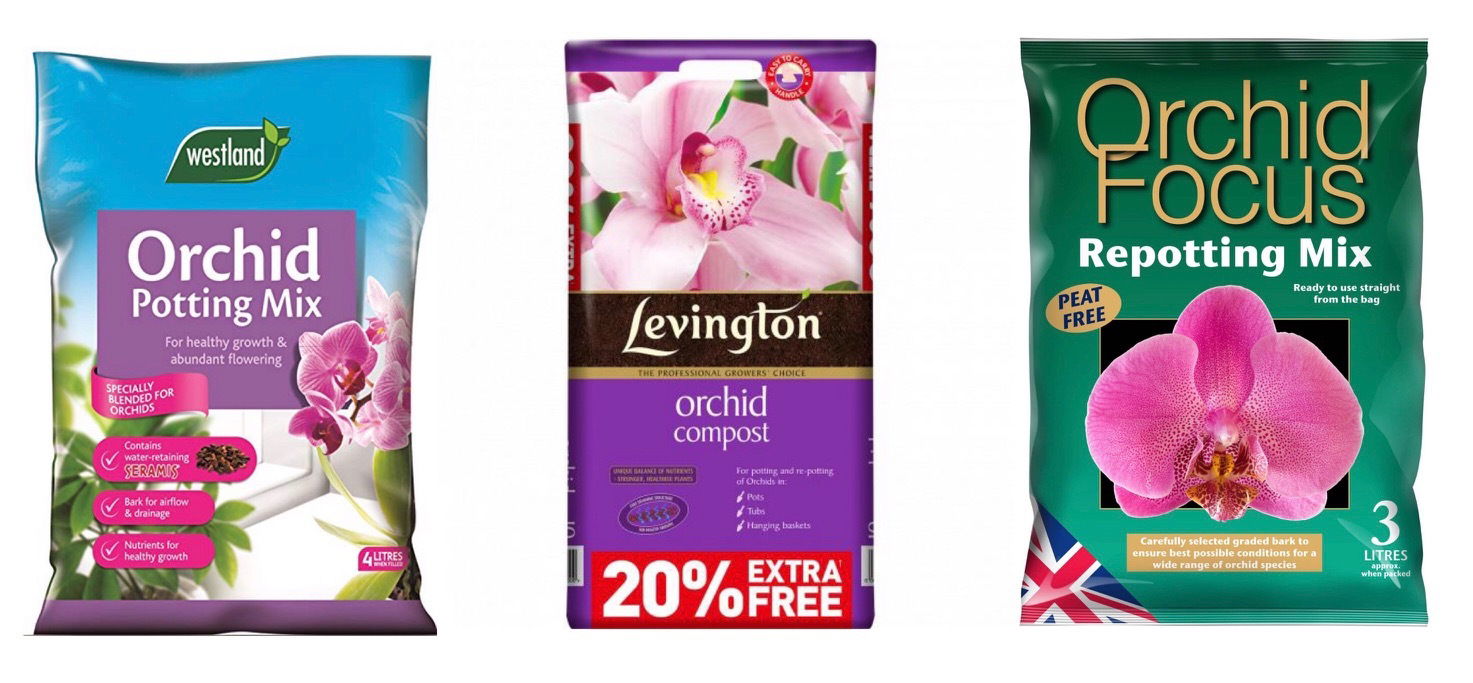 UK Orchid Barks
UK Orchid Barks
• Provides oxygen & nutrients to the roots
• Can be purchased at all garden centres & online stores
• Mandatory for all Orchids, whether it's on its own or a mixture of this & Houseplant Compost
Westland & Levington
These products include a splash of fine-graded compost, meaning that this isn't just bark segments. This potting-mix is best used for:
- Anthurium - Flamingo Plant (Not an Orchid but still needs bark)
- Brassia
- Cambria
- Cattleya
- Dendrobiums
- Jewel Orchids - Ludisia
- Macodes discolor (Can be grown either in Sphagnum Moss or this compost's ratio)
- Miltonia
- Oncidiums
- Slipper Orchids - Paphiopedilum
Orchid Focus
This product consists only of bark segments, meaning that there isn't peat or coconut coir. This is acceptable for Orchids that need good airflow between the roots. (Think of the potting-mix used in supermarket Orchids).
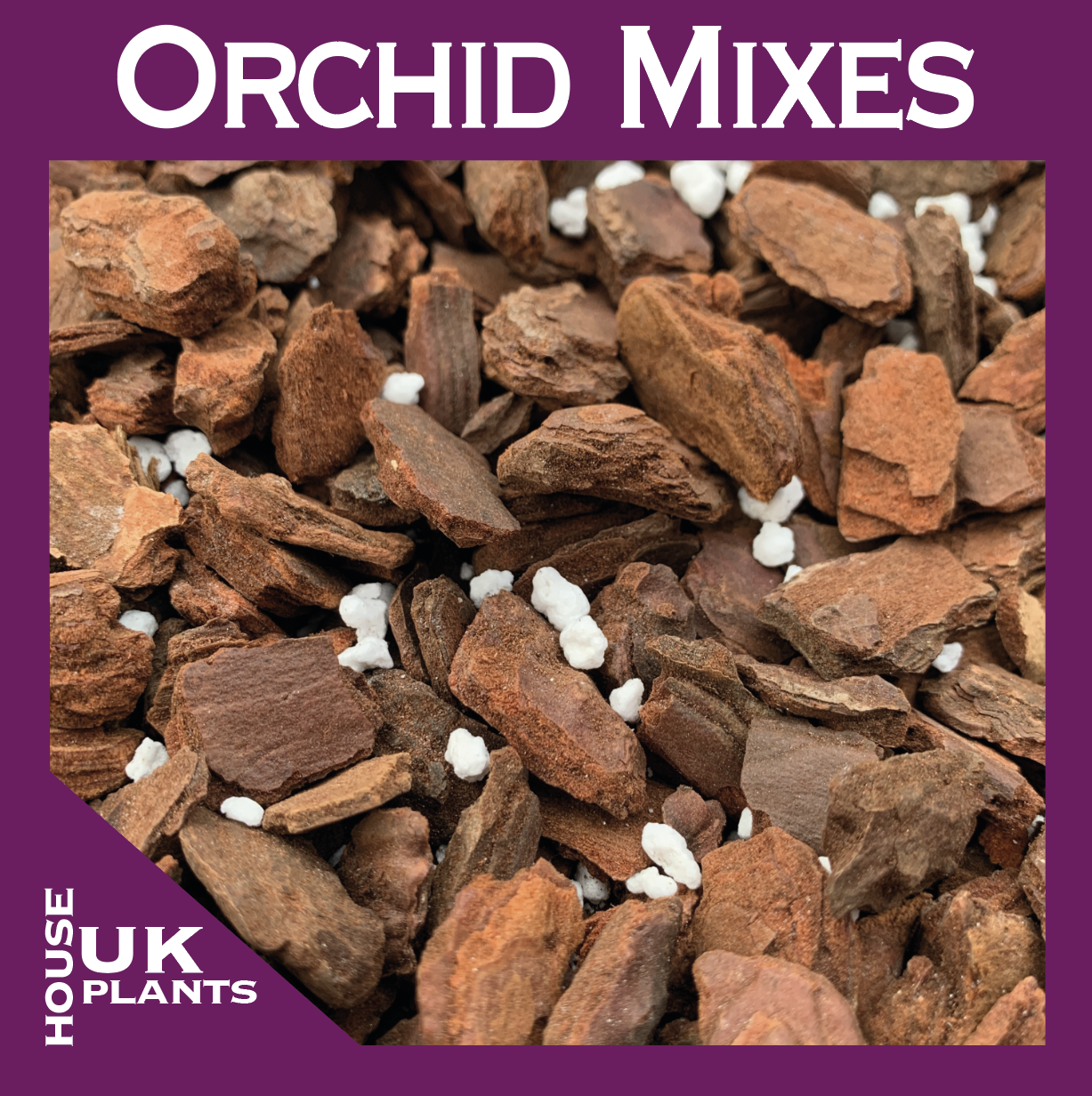
Top quality Orchid Bark that you can see. Shop our different sizes & enjoy free delivery throughout the UK! From £3.99
6. Bonsai Compost
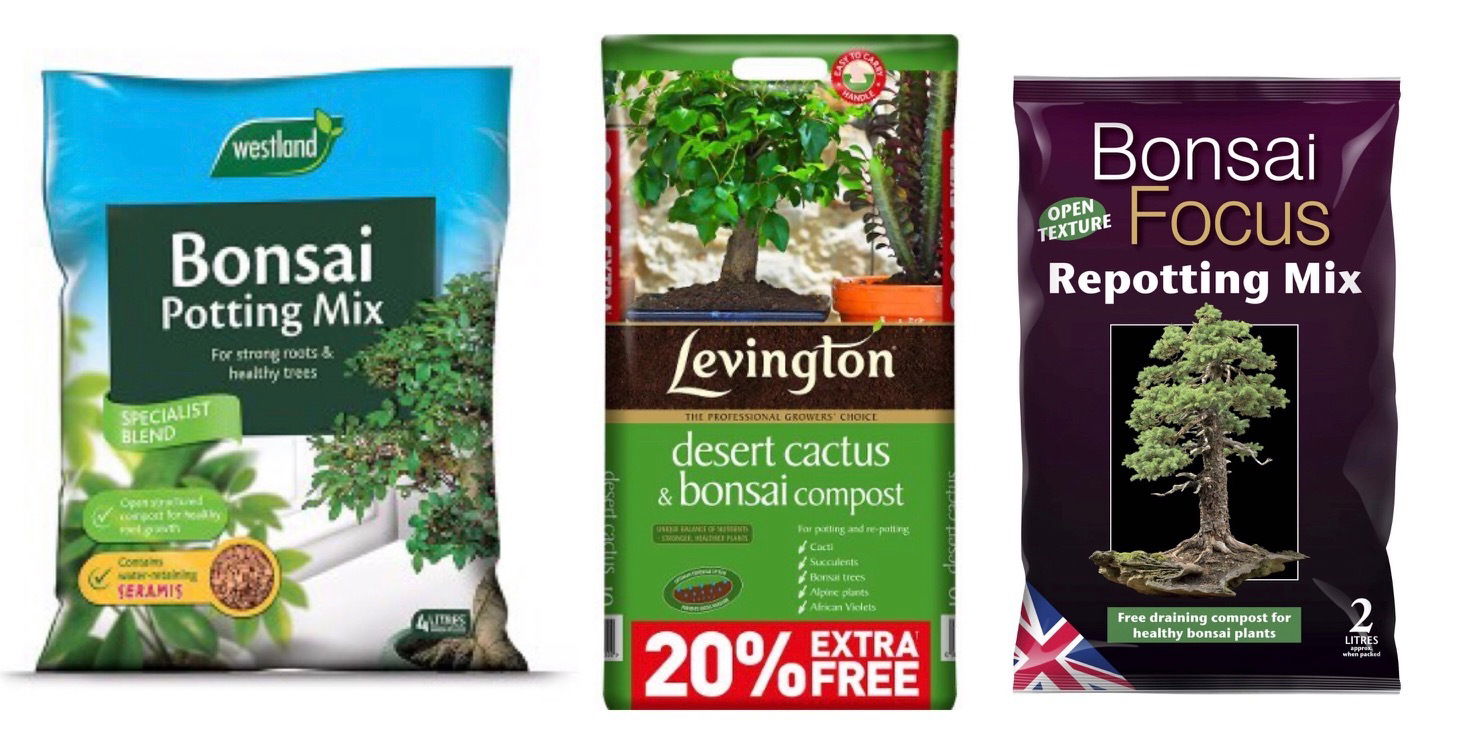 The Top 3 Bonsai Soils (UK)
The Top 3 Bonsai Soils (UK)
• Houseplant Compost can be substituted if necessary
• Bonsai Compost is well equipped for the development of a healthier rootball
• Available at some garden centres
7. Citrus Compost
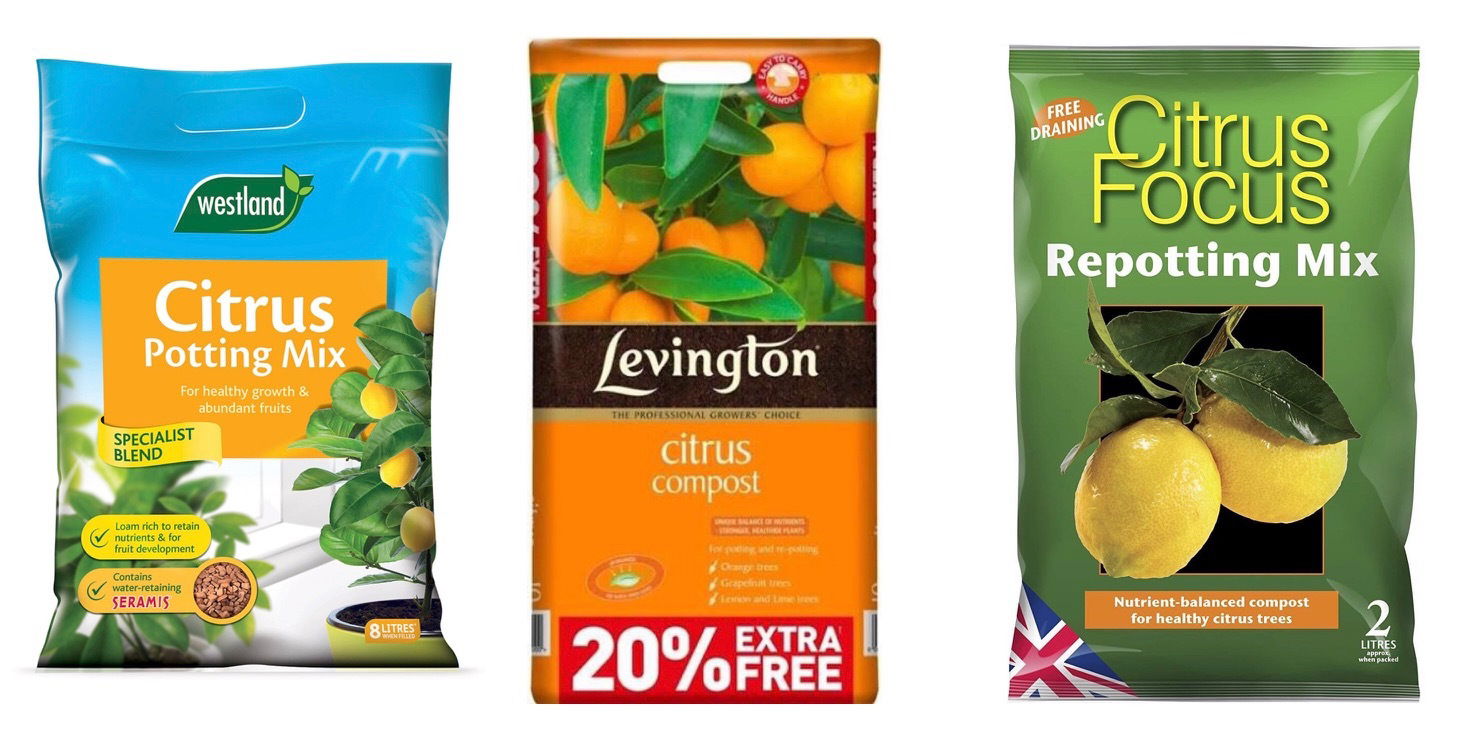 ukhouseplants' Recommended Citrus Soils
ukhouseplants' Recommended Citrus Soils
• Aids the flowering and fruiting process
• Provides a blend of nutrients and a loam-based texture for better overall health
• Can be substituted for Houseplant Compost when extra sand or grit is added
- Calamondins
- Grapefruits
- Mandarins
- Kumquats
- Lemons
- Limes
- Oranges
- Olives Trees (not a Citrus, but still suitable)
- Satsuma
- Tahitian
8. Ericaceous Compost
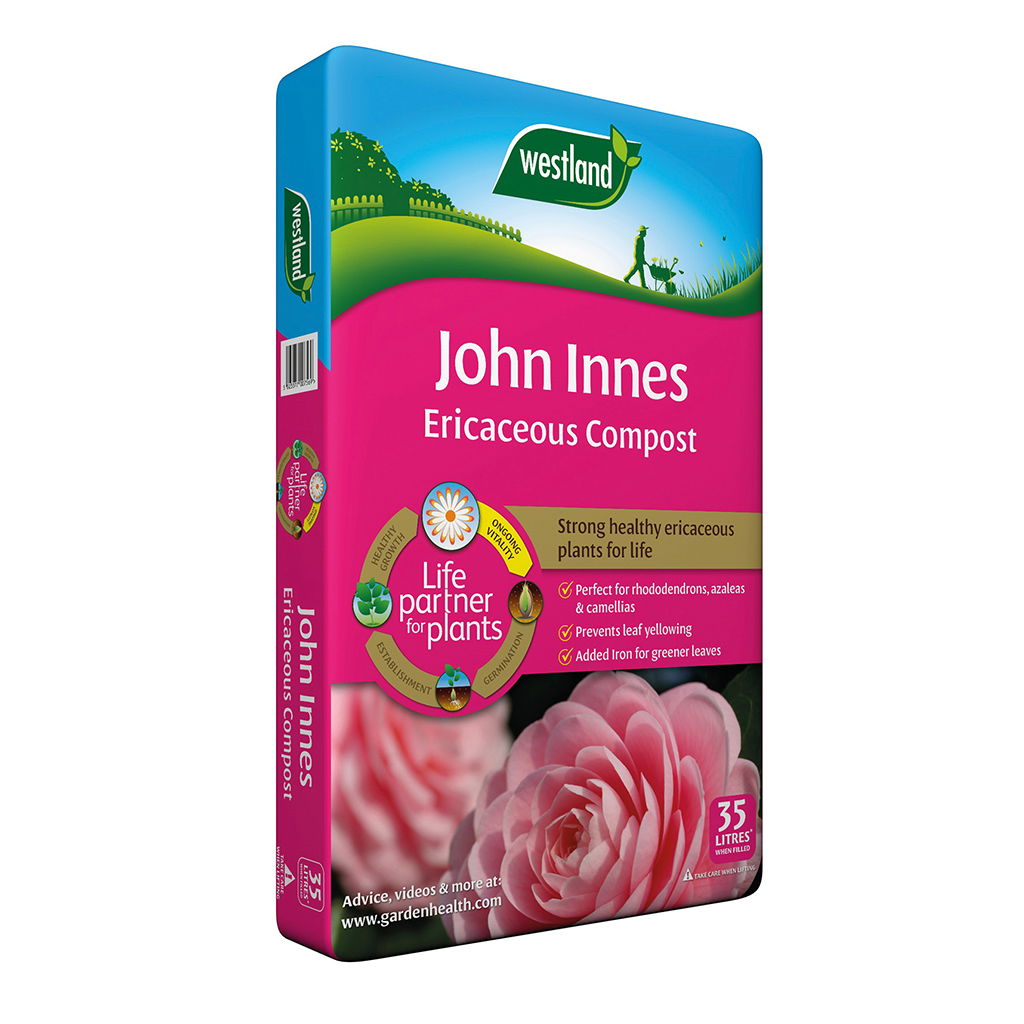
• Mandatory for lime-hating plants
• Houseplant Compost should not be used as it'll cause burning roots with Ericaceous specimens
• Can be bought at all garden centres - typically sold outdoors but can be used for indoor specimens
- Azalea
- Camelia
- Rhododendrons
9. Terrariums
• Desert Terrariums - 'Cacti & Succulents' Compost
• Tropical or Foliage Terrariums - 'Houseplant' Compost (add sand & perlite, too)
• Carnivorous Terrariums - 'Carnivorous' Soil
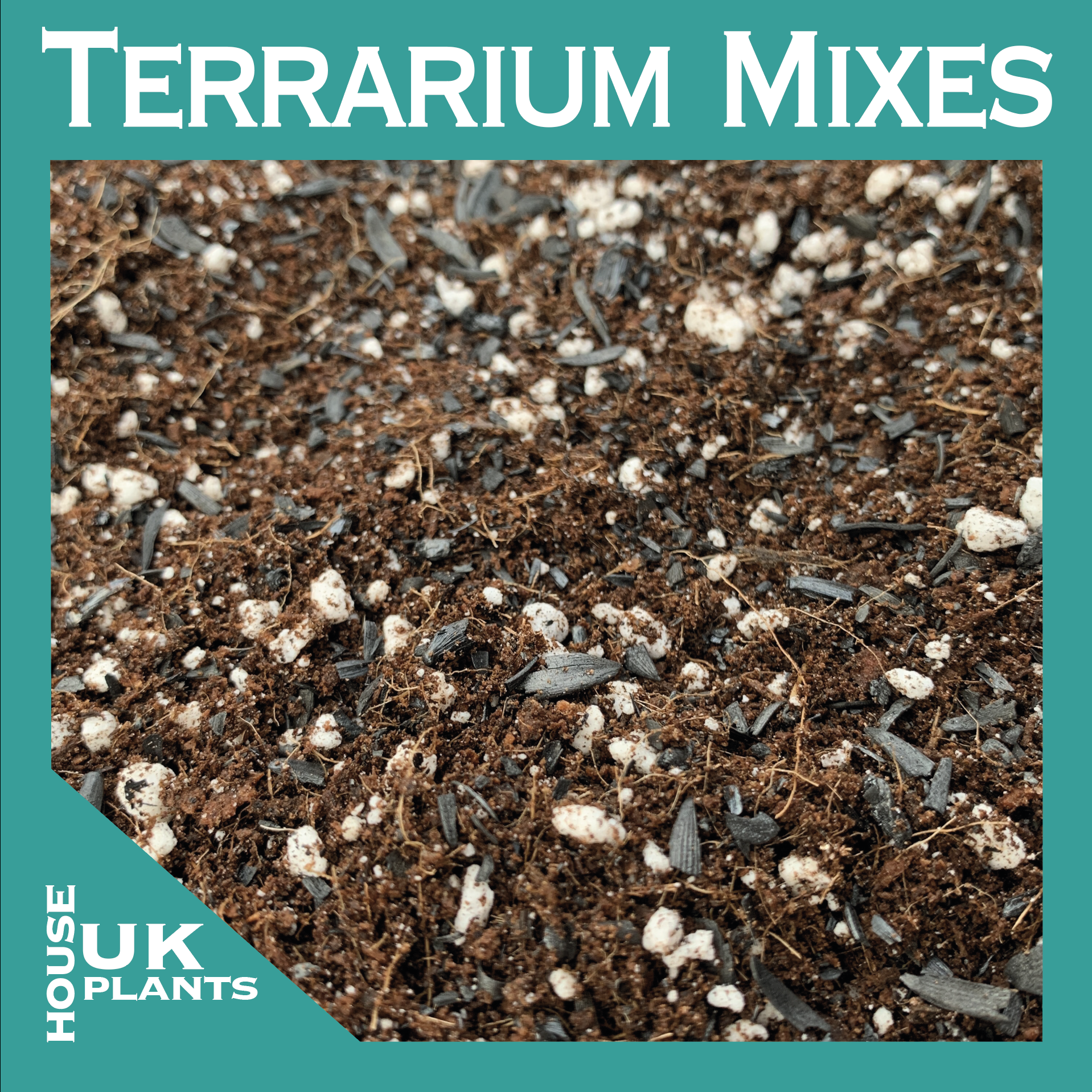
Our Terrarium Potting Mixes comes packed with everything you need for a happy and successful display, including perlite, vermiculite, worm castings, mycorrhizal fungi in a coconut coir base. Click on this link to find out more!
10. Indoor Herbs
• Contains grit and perlite to promote strong, resilient roots
• Houseplant Compost can be used if you work a generous amount of 'Horticultural Grit' into the mix before transplantation
• Often difficult to find at garden centres or supermarkets.
- Basil
- Caraway (Persian Cumin)
- Chervil
- Chives
- Coriander (Cilantro)
- Dill
- Fennel
- Laurel (Bay Leaf)
- Lemon Balm
- Mint
- Oregano
- Parsley
- Rosemary
- Sage
- Tarragon
- Thyme
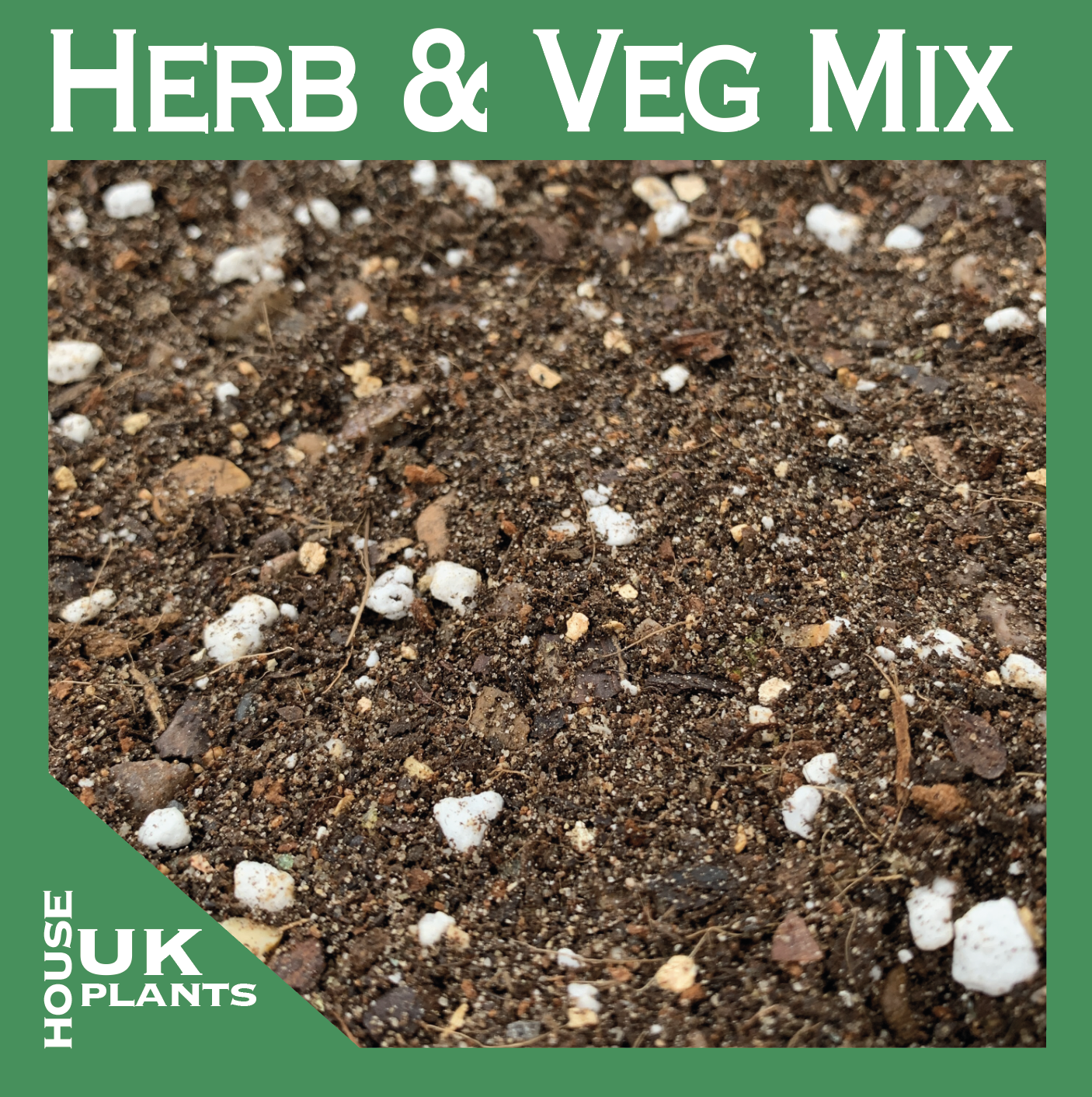
Shop our peat-free Indoor Herb Compost here! £4.95 with Free Delivery.
11. Making Your Own Potting-Mix
Creating your own potting-mix from Multi-Purpose Compost is rewarding but tough, especially when picking out your soil-brand. Many contain peat, or at the very least, large bits of bark and twigs that much be sifted out before repotting your plant. When you find a good quality compost, you'll soon learn about the benefits of understanding of how plants interact with their soils. The image below comprises the five main ingredients needed to create your own indoor compost successfully.
You may think that using a water-retentive soil-profile like Multi-Purpose Compost is a bad idea - but hold your horses. Mixing this with the correct amount of perlite, sand, or grit will ensure that even succulents can thrive in it. For each of the following images, have a look at the textures and ratios of each ingredient.
N. B. - We recommend using a traditional blend of compost, which is typically a finer-grade of potting mix. If you're worried about hurting your plants with the wrong soil, you can always purchase one of our indoor potting mixes to ensure continued good plant health!
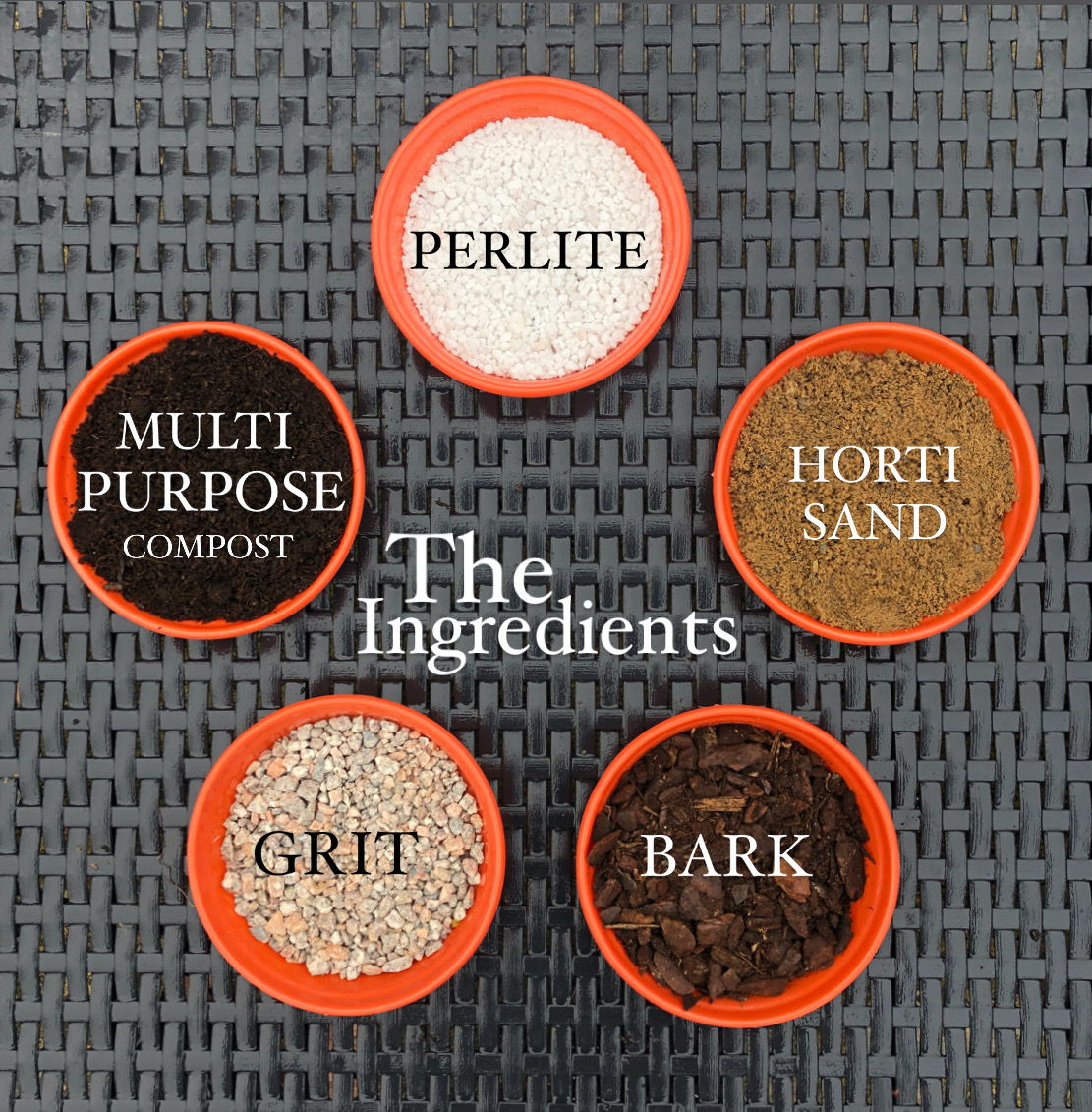 The five main ingredients which are used in our ratios below!
The five main ingredients which are used in our ratios below!
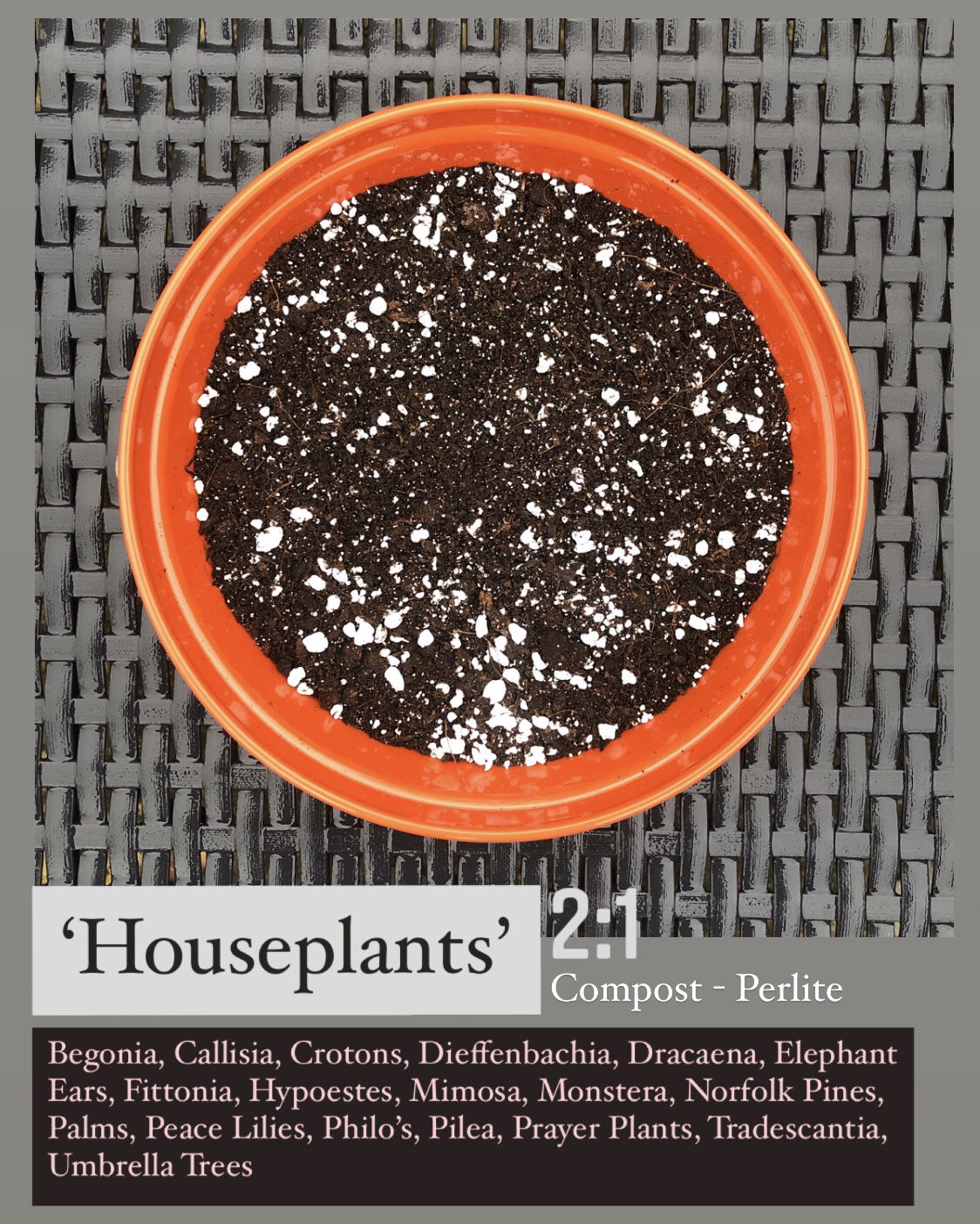 ...also Bromeliads, Chinese Evergreens, Cissus, Coffee Plants, Common Ivy, Dinner Plate Aralia, Fatsia, Fiddle-Leaf Figs, Lipstick Plants, Maidenhair Ferns, Murdannia, Pachira, Pellionia, Streptocarpus, Syngoniums.
...also Bromeliads, Chinese Evergreens, Cissus, Coffee Plants, Common Ivy, Dinner Plate Aralia, Fatsia, Fiddle-Leaf Figs, Lipstick Plants, Maidenhair Ferns, Murdannia, Pachira, Pellionia, Streptocarpus, Syngoniums.
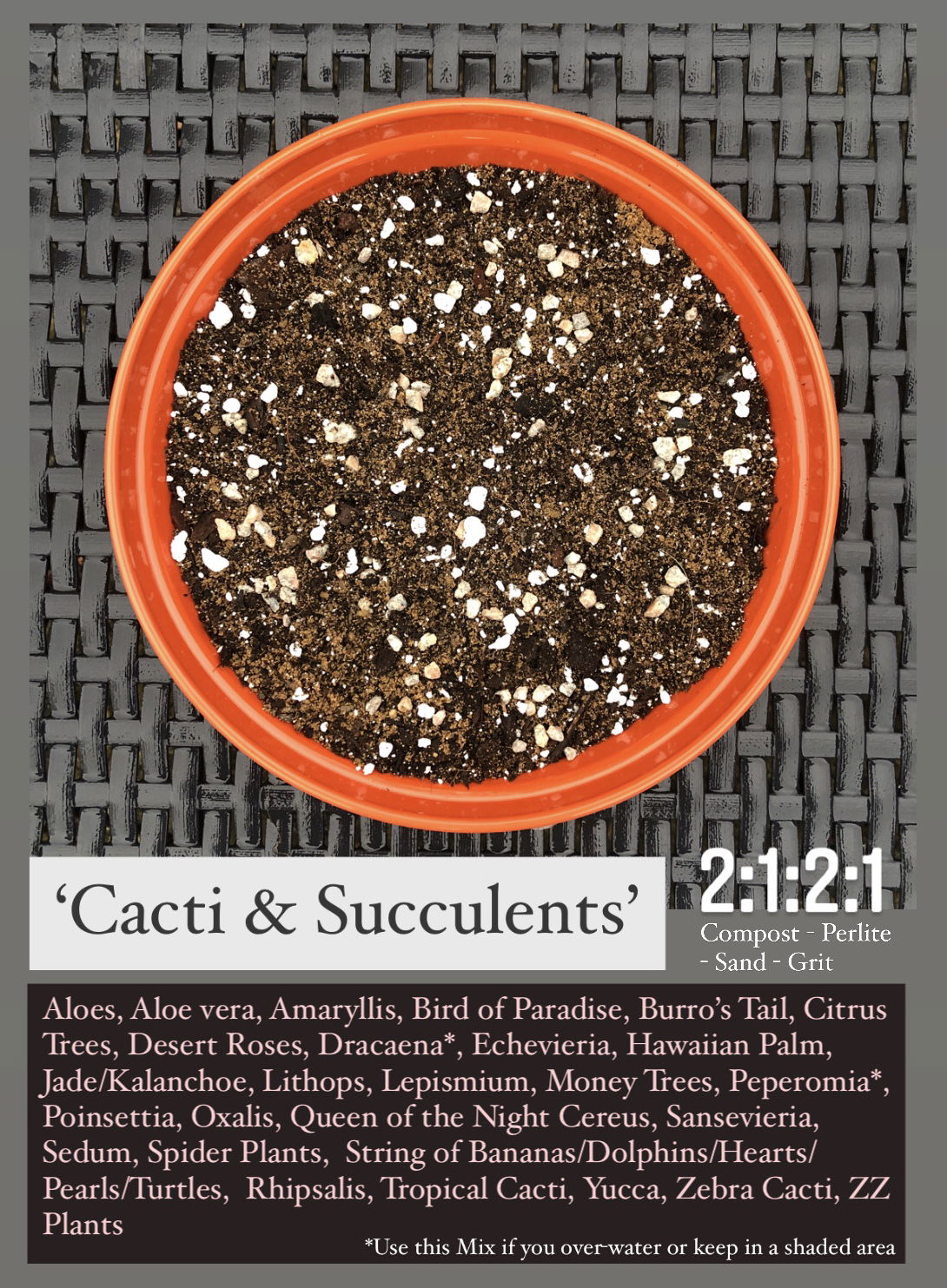
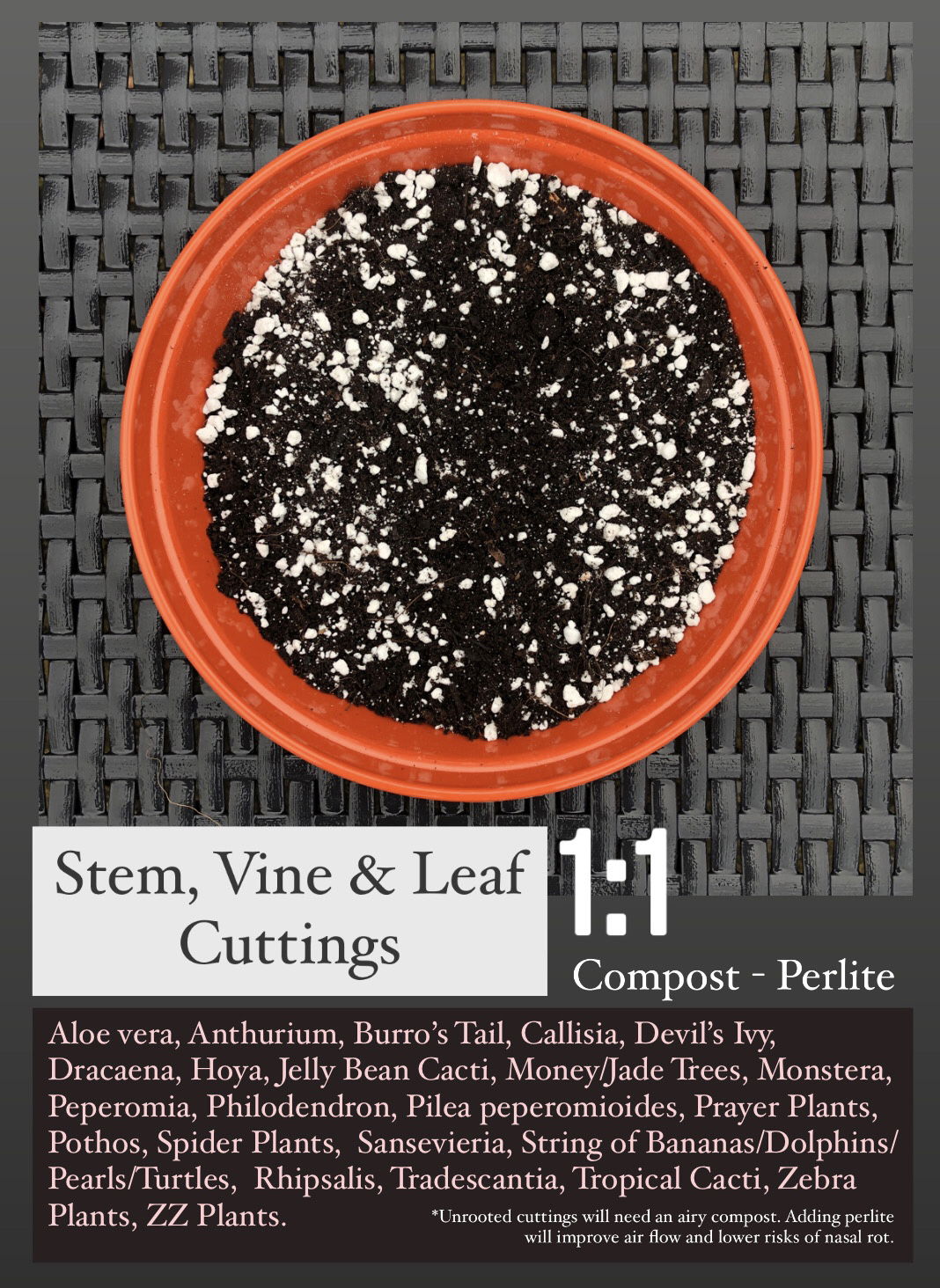
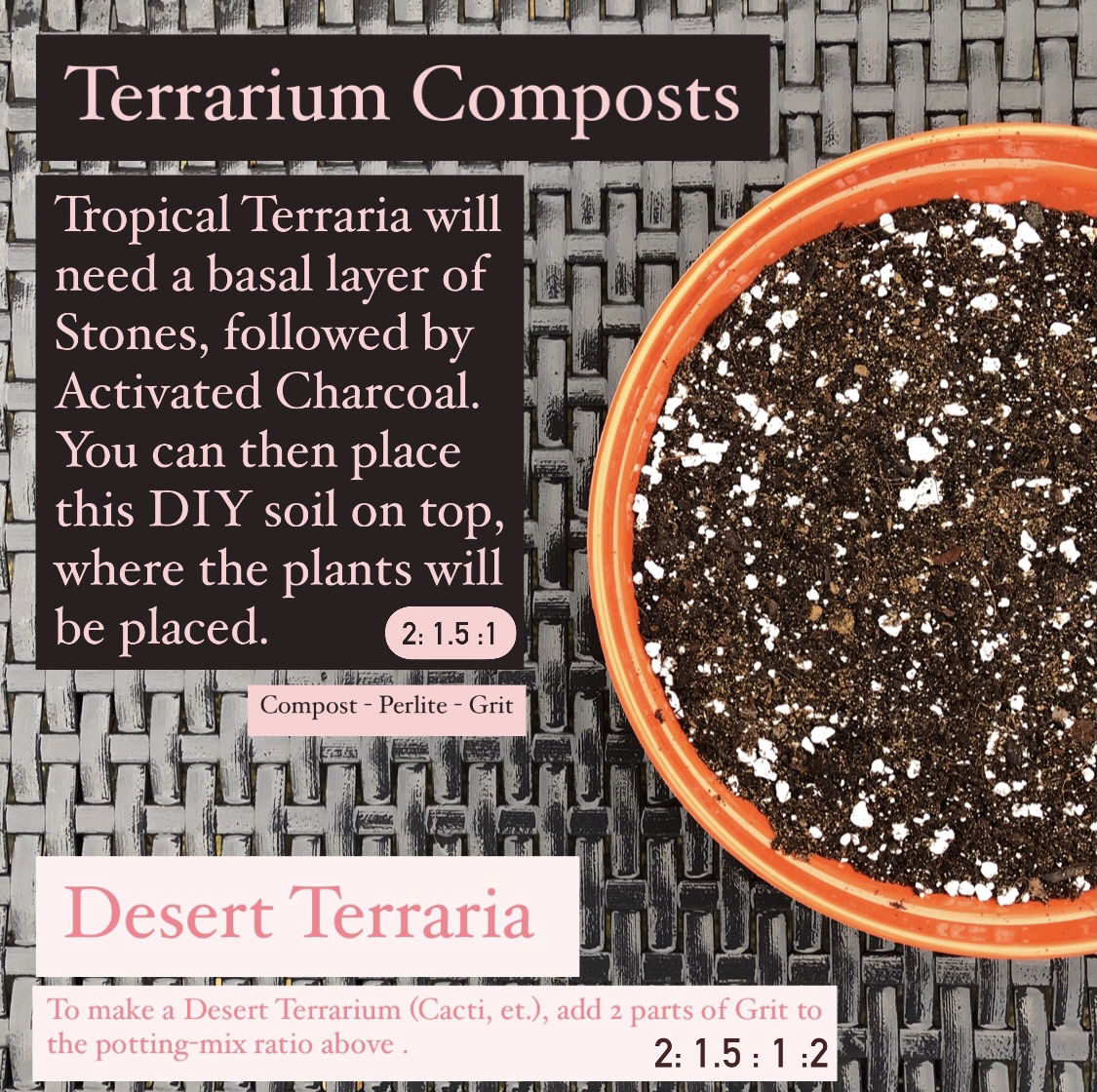
Book a 1-to-1 Consultation with THE HOUSEPLANT DOCTOR™
Need realtime advice for your houseplant potting mixes? Book a video or message consultation with expert Joe Bagley, THE HOUSEPLANT DOCTOR™ (author or ukhouseplants.com). Choose between a ten or thirty-minute session & a platform of your choice (WhatsApp, FaceTime, Facebook Messenger or Zoom). Ask unlimited questions in one session, including queries on your dying/challenging plants, pests eradication, terrariums, repotting advice & everything in between! Available worldwide.
